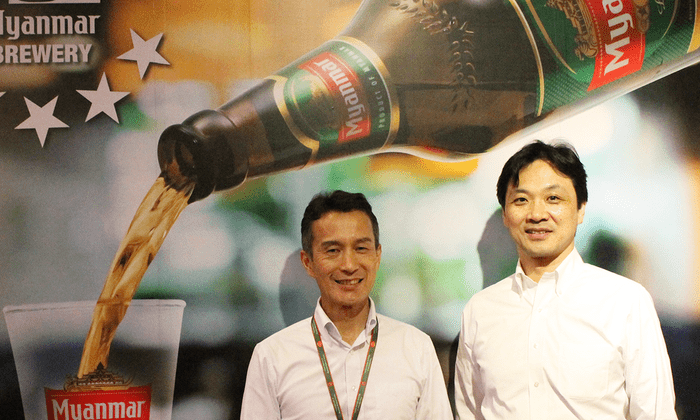Japanese companies have grown increasingly aggressive with global M&A. Entering new markets brings not only business opportunities, but a chance to spread unique corporate cultures and leadership styles.
In 2015, Japanese beer maker Kirin threw its hat in the ring with the acquisition of Myanmar Brewery Ltd. (MBL). GLOBIS faculty Toru Takahashi spoke with MBL president Takeshi Minakata about entering this new market and how a “feel the wind” style of leadership is helping him succeed.
TT: How did Kirin come to acquire MBL, and how’s it going so far?
TM: The key was meticulous preparation and commitment from the top. The Japanese domestic beer market is expected to shrink while other parts of Asia grow. Myanmar, in particular, has a much bigger capacity for growth than its neighbors. Per capita annual beer consumption is just six liters in Myanmar, compared to thirty to forty liters elsewhere. Moreover, the political system is expected to open up, and MBL has a very strong brand. So, all the necessary conditions were in place to do business.
After the acquisition, in just seven months, we increased development and production capabilities, launching Ichiban Shibori and Myanmar Premium. Timely technical support and provision of marketing know-how also contributed to a visible improvement in results. But gathering information well in advance has contributed a lot to our success, as well.
With quick and visible wins, we were able to earn the trust of local employees. We shared know-how from HQ, of course, but also provided a place to learn from other overseas investment destinations, such as Australia, the Philippines, and Brazil. Employees who had not even known there was a beer company in Japan were able to relax and get along working with us.

TT: Large companies often struggle to get operations started overseas. How did you make things happen so quickly?
TM: The make-or-break of M&A is ensuring management and front-line staff are working together as one. The vision and philosophy should inspire a strong urge to put in the resources to build an operation. We were keenly aware of making this important market a success. And based on experience, we knew it was essential to make everyone aware of the pitfalls when investing in an overseas market. Specifically, there are three questions to keep in mind:
1) Can we utilize our strengths?
2) Can we manage the company hands-on? (We must know exactly what is happening on the factory floor and market, and what the customer values)
3) Can we convert enough new customers?
We knew it was important not to just push Kirin thinking onto MBL, but to help our people realize that they have something to learn, too. MBL has many highly talented people who boosted our success.
TT: How do you nurture talent?
TM: The most important thing is to lead by example and embody the ideal. If a leader does not move, neither will the staff. Seeing customers and workers in action is extremely important. Leaders need to “feel the wind,” using all five senses to understand changes in the market. I myself am clumsy and not a fast thinker, so I always try to get back to basics: see and feel things for myself. I like to smell the yeast, check its color with my own eyes, and touch it with my hands.
Those who think they understand a business from behind a desk are the most dangerous.
TT: What are the most important skills for a leader?
TM: Cooperation, understanding the competition, and communication are essential. When working in an emerging economy like Myanmar, it is important not to look down on the market. You need to draw out ideas. Opinions from the front line will only reach the top if people are not worried about upsetting the leader.
You also need interest and curiosity. You can’t feel for something if you don’t have these. Put another way, if you are not interested or curious about management, you should not be a manager.
I wish that all young managers in Japan could come to Myanmar and experience this environment for themselves. Myanmar has a complete supply chain, so it’s a fantastic opportunity to grow.

TT: What is your message to people doing business around the world?
TM: Aim to establish your style no matter where you are. From my experience, if you can do it at home, you can do it abroad. My style of understanding the front line is the same in Japan and Myanmar. You need to stay true to your beliefs. Your compass for making decisions should not change.



